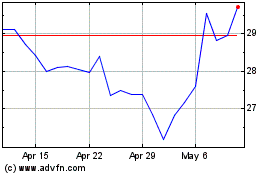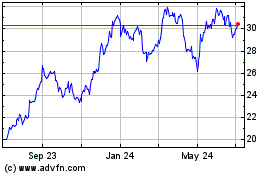UBS Profit Doubles on Trading Surge -- 3rd Update
October 20 2020 - 8:15AM
Dow Jones News
By Margot Patrick
UBS Group AG said its net profit nearly doubled in the third
quarter on a surge in client trading and deal making, freeing up
cash for dividends and share buybacks despite the coronavirus
pandemic.
Tuesday's results highlight a growing divide between stronger
and weaker banks in Europe as the pandemic hits some countries and
business models harder than others. UBS's investment bank, like
others, is benefiting from higher-than-usual customer activity
while its wealth-management arm has gained net new money from
clients to invest as global wealth rebounds from a spring rout.
Most of the Swiss bank's lending is to the world's rich and to
Swiss households and businesses, areas that have held up relatively
well in the pandemic. Many large U.S. and European rivals, in
contrast, have taken hefty provisions on their consumer and
corporate loans to reflect weaker economic outlooks than in
Switzerland.
UBS said it set aside $1.5 billion to repurchase shares next
year and has accrued $1 billion in cash for 2020 dividends. A
delayed dividend from 2019 will be paid next month, UBS said. It
had conserved the cash earlier this year after Swiss regulators
asked banks to do so.
Net profit rose to nearly $2.1 billion from $1.05 billion a year
earlier. Loan losses in the period were $89 million, lower than the
$268 million and $272 million provisions taken in the first and
second quarters, and well below the levels of many rivals.
The bank said the pandemic has been changing the way clients
interact with the bank, bringing more of them online through
mobile-banking applications and other platforms. Its wealthy
customers have also been on an "intensified search for returns,"
UBS said in a presentation, with some increasing their investments
in private markets, an area that includes buying stock and lending
money to companies that aren't publicly traded.
UBS executives said their wealthy clients have been more active
in stock markets and in making private-market investments, and have
been looking at how to position their portfolios around next
month's U.S. presidential election. In a recent investor survey,
72% said they were considering making changes before the election
and 62% planned to make investment changes after the result. The
coronavirus pandemic continued to be investors' top concern,
according to the survey.
UBS's investment bank revenue jumped to $2.49 billion from $1.75
billion a year earlier, while global wealth-management revenue rose
to $4.28 billion from $4.14 billion.
The bank's relatively insulated position has put it among
Europe's healthiest banks in terms of returns on equity and its
capital base. It has considered combining with smaller rival Credit
Suisse, according to people familiar with the matter, and analysts
expect it to be part of a burgeoning wave of banking consolidation
in the region.
From Nov. 1, former ING Groep NV Chief Executive Ralph Hamers
will take over from UBS's CEO of nine years, Sergio Ermotti. Mr.
Ermotti on Tuesday said UBS has "all the options open" for more
success under Mr. Hamers.
Under Mr. Ermotti, UBS shrank its investment bank and refocused
on wealth management. It was regarded as a largely successful
reinvention of the bank and the model has been copied by others,
including Credit Suisse.
Because of its rosier prospects, UBS's share price has
outperformed rivals this year and the broader European banks
index.
Write to Margot Patrick at margot.patrick@wsj.com
(END) Dow Jones Newswires
October 20, 2020 08:00 ET (12:00 GMT)
Copyright (c) 2020 Dow Jones & Company, Inc.
UBS (NYSE:UBS)
Historical Stock Chart
From Mar 2024 to Apr 2024

UBS (NYSE:UBS)
Historical Stock Chart
From Apr 2023 to Apr 2024
